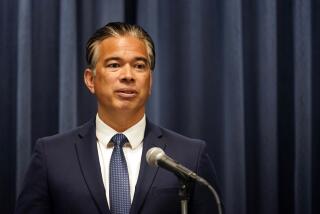FDIC sues four former IndyMac executives
Launching a new offensive against leaders of failed financial institutions, federal regulators are accusing four former executives of Pasadena’s defunct IndyMac Bank of granting loans to developers and home builders who were unlikely to repay the debts.
The lawsuit by the Federal Deposit Insurance Corp. alleges that the IndyMac executives acted negligently and seeks $300 million in damages.
It is the first suit of its kind brought by the FDIC in connection with the spate of more than 250 bank failures that began in 2008. Regulators said it wouldn’t be the last.
“Clearly we’ll have more of these cases,” said Rick Osterman, the deputy general counsel who oversees litigation at the agency.
The FDIC has sent letters warning hundreds of top managers and directors at failed banks — and the insurers who provided them with liability coverage — of possible civil lawsuits, Osterman said. The letters go out early in investigations of failed banks, he added, to ensure that the insurers will later provide coverage even if the policy expires.
The four defendants in the FDIC lending negligence case, who operated the Homebuilder Division at IndyMac, collectively approved 64 loans that are described in the 309-page lawsuit.
They are:
•Scott Van Dellen, the division’s president and chief executive during six years ending in its seizure;
•Richard Koon, its chief lending officer for five years ending in July 2006;
•Kenneth Shellem, its chief credit officer for five years ending in November 2006;
•William Rothman, its chief lending officer during the two years before the seizure.
Through their attorneys, they vigorously denied the allegations.
“The FDIC has unfairly selected four hard-working executives of a small division of the bank … to blame for the failure of IndyMac,” said defense attorney Kirby Behre, who represents Shellem and Koon. “We intend to show that these loans were done at all times with a great deal of care and prudence.”
Defense attorney Michael Fitzgerald, who represents Van Dellen and Rothman, said no one at the company or its regulators foresaw the severity of the housing crash before it struck, and that IndyMac was one of the first construction lenders to pull back when trouble struck the industry in 2007.
Fitzgerald added that the FDIC thought Van Dellen trustworthy enough that it kept him on to run the division after the bank was seized.
The suit naming the IndyMac executives was filed this month in federal court in Los Angeles, two years after the July 2008 failure of the Pasadena savings and loan. The bank is now operated under new ownership as OneWest Bank.
IndyMac, principally a maker of adjustable-rate mortgages, was among a series of high-profile bank failures early in the financial crisis that were blamed on defaults on high-risk home loans and the securities linked to them.
But the majority of failures since then have been at banks hammered by losses on commercial real estate, particularly loans to residential developers and builders — and IndyMac had a sideline in that business as well through its Homebuilder Division.
The suit alleges that IndyMac’s compensation policies prompted the home-building division to increase lending to developers and builders with little regard for the quality of the loans.
“HBD’s management pushed to grow loan production despite their awareness that a significant downturn in the market was imminent and despite warnings from IndyMac’s upper management about the likelihood of a market decline,” the FDIC said in its complaint.
An investigation of IndyMac’s residential mortgage lending practices could lead to another civil suit, potentially naming higher-up executives, attorneys involved in the case said.
Separately, a criminal grand jury investigation into the actions of IndyMac executives continues, according to a knowledgeable federal official who was not authorized to publicly discuss the investigation.
The bank, known mostly for providing home loans without requiring proof of income from borrowers, had operated its builder-loan division since 1994.
The lawsuit said IndyMac had about $900 million in land acquisition, development and construction loans on its books when the bank collapsed. Losses on the portfolio are expected to total $500 million — minus whatever the FDIC can recover through litigation.
The FDIC’s Osterman said the government recovered about $5.1 billion from former bank and thrift executives and their outside professional advisors after the last major financial crisis devastated the savings and loan industry in the 1980s. Most of the money came from insurers that had written policies covering bank directors and officers against negligence or other misdeeds.
Because the warnings of possible lawsuits are mailed out during the early stages of investigations, it’s frequently decided later that the cases aren’t strong enough to bring or aren’t likely to be cost-effective and so are dropped, Osterman said.
FDIC spokesman David Barr said the agency generally had three years from the date of a failure to file civil cases.
More to Read
Inside the business of entertainment
The Wide Shot brings you news, analysis and insights on everything from streaming wars to production — and what it all means for the future.
You may occasionally receive promotional content from the Los Angeles Times.











